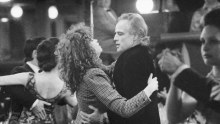'A national security risk': Australian Border Force warns illegal tobacco trade may be fuelling terrorism
Updated
 Video: 7.30 joins Australian Border Force on an early morning raid looking for illegally smuggled tobacco.
(ABC News)
Video: 7.30 joins Australian Border Force on an early morning raid looking for illegally smuggled tobacco.
(ABC News)
Australians may not equate illegal tobacco smuggling with drug trafficking or terrorism fundraising, but senior border security officials are warning it may be fuelling both and posing a national security risk.
Key points:
- Illegal tobacco smuggling in Australia linked to terrorism and drug trafficking, AFP warns
- Concerns Middle Eastern crime gangs are sending tobacco proceeds overseas
- As Government raises prices of cigarettes, demand for illegal tobacco grows
In an exclusive interview with the ABC's 7.30 program and Fairfax Media, Australian Federal Police assistant commissioner Wayne Buchhorn — who has been seconded to Australian Border Force (ABF) — said he had "significant" concerns that some of the proceeds of the booming illicit tobacco smuggling trade into Australia were flowing to extremist groups overseas.
"We are seeing crime gangs here in Australia, oftentimes Middle Eastern organised crime gangs, and the connections back into the Middle East ... [are] a significant concern for us in the current environment," he said.
"The funding of extremist activities, we are seeing some elements of that."
A notorious Middle Eastern crime syndicate operating in Arncliffe, Sydney, which is involved in both drug and tobacco smuggling, has shrugged off the repeated arrest and prosecution of its members to continue importing contraband.
Police intelligence has linked the syndicate to fundraising for a Lebanese charity aligned with extremist group Hezbollah.
The group is also suspected of involvement in the brutal bashing of a British American Tobacco executive outside his family home in Sydney in May.
7.30 can also reveal that ABF investigations into organised crime are being stymied by the agency's lack of modern powers, including the ability to using tracking devices or, in some circumstances, conduct raids and arrest suspects without the backing of the Federal Police.
With border security a significant political issue, albeit focused mostly on people smuggling, the revelations put pressure on the Federal Government to respond to concerns about ABF powers and resourcing.
'Potential to cause corruption'
 Video: AFP assistant commissioner Wayne Buchhorn says illegal tobacco is "probably a billion dollar trade" in Australia.
(ABC News)
Video: AFP assistant commissioner Wayne Buchhorn says illegal tobacco is "probably a billion dollar trade" in Australia.
(ABC News)
The illicit tobacco trade has received far less attention from police and security agencies when compared to terrorism, drug and weapons trafficking and people smuggling, despite the potential for overlap between the types of crime.
Attracted by the huge revenue streams and lesser penalties applied to those caught tobacco smuggling, organised criminals have moved with relish into the trade, using proceeds of tobacco smuggling to pay for other activities.
Mr Buchhorn's investigators, along with the NSW and Federal Police, have uncovered smuggling syndicates in Sydney using fronts to obtain Federal Government licences to operate freight depots or customs broking agencies. These are then used to facilitate further contraband importations.
"It is used to fund drug importations. There is also evidence it is utilised in other serious organised crime type activities," Mr Buchhorn said.
"I would consider it [a national security threat] because [of] the potential for organised crime groups to attack the institutions of state, whether through corruption or through their infiltration of legitimate supply chains.
"That has the potential to cause corruption within government agencies and more broadly. So the potential for that to be a national security risk for me is very real."
The US State Department has described international tobacco smuggling as a "threat to national security", while the United Nations and OECD have also recently raised serious concerns about the impact of the illicit trade.
Black-market cigarettes 'probably a billion dollar trade'
Mr Buchhorn, who has served in senior policing roles in Australia and Afghanistan, said it was extremely easy to buy black-market cigarettes in Australia, fuelling what was "probably a billion-dollar trade".
Successive Federal Government tobacco tax hikes — Treasurer Scott Morrison unveiled further increases in the May Budget that will lift the price of a pack of smokes from $25 to $40 — boost the financial return for organised smuggling syndicates.
The tax hikes deliver significant public health benefits and a much-needed Government revenue stream, but it is unclear whether the impact on organised crime in Australia has been deeply considered by policy makers.
In June, the Federal Government announced a modest $7.7 million funding boost over two years for the ABF's small tobacco strike teams.
Post boxes used to receive illegal tobacco
Tobacco Strike Team Inspector Allister Keel, who recently led a major investigation that seized approximately 4.5 tonnes of illicit tobacco and more than 615,000 cigarette sticks imported by an organised crime syndicate, described a steady stream of importations from China and the Middle East.
"It's a ... highly prevalent activity, and if you look at the activity down at the docks and if you look at the number of organised crime syndicates that are attracted towards this type of illicit activity, there is a lot coming in and quite simply it's very hard to pick up everything," Mr Keel said.
"We are under no illusion about how big the problem is.
"There are a number of syndicates like this, potentially even larger, who are dealing in illicit tobacco products and bringing shipments in on perhaps an even more regular basis."
Mr Keel's recent investigation also identified post boxes at over a dozen Australia Post outlets being using by an Asian criminal syndicate to import black market cigarettes.
"The syndicate members over here would simply open any number of postal [boxes] ... in their own name or family's name or friend's name to receive these parcels of illicit tobacco products that they would then on sell through the online platform or through other retailers."
Mr Keel's investigation led to the arrest of four illegal tobacco industry figures, including a man targeted by the Australian Consumer Competition Commission in 2007 for selling smuggled cigarettes online.
Topics: tobacco, law-crime-and-justice, terrorism, police, australia
First posted









